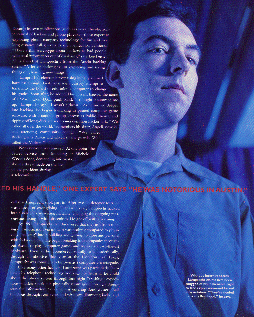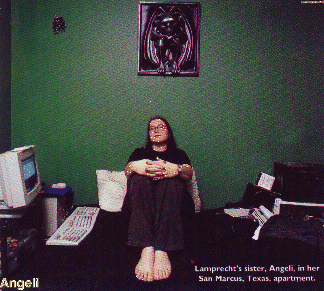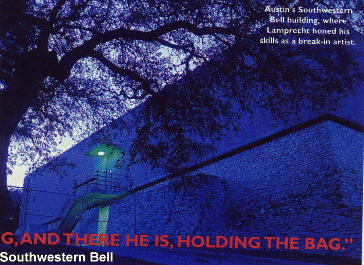
 Swing Magazine
Swing Magazine
By J.D.Heiman
Photographs by Wyatt McSpadden

Before I first met with the computer hacker and convicted felon who goes by the handle of Minor Threat, I am warned. "You have no idea what these people can do," says a reporter who's familiar with the digital underground. She tells me Minor Threat and his hacking buddies are cyber sociopaths who get off on mangling credit histories, tampering with telephone lines, invading e-mail accounts, and crashing hard drives. "They might mess with you just because they can," she says. "It's a power game." So I am prepared to greet Darth Vader behind the razor wire of the federal correctional institution in Bastrop, Texas, about 30 miles south of Austin. Instead, I see Christopher Matthew Lamprecht, a soft-spoken, gangly 24-year-old, aptly described by a former employer as "a goofy, Ichabod Crane type." Lamprecht has gained 10 pounds since he was incarcerated in January 1995, but he's still a pale wraith of a man, with thin wisps of brown hair framing his high, freckled brow. Sitting in the waiting room amid drug dealers and armed robbers, he looks more like a refugee from a college chess tournament than a high-tech supervillian.
Yet Lamprecht is serving a 70-month sentence -- more time than any hacker has received to date, and longer than many of the drug dealers and violent offenders with whom he's incarcerated -- on money-laundering charges related to the theft and sale of $1 million worth of telecommunications circuit boards. Although Lamprecht is a hacker, his crimes have nothing to do with cyberspace or breaking into computer systems. Despite that, he has been banned from using the Internet, or a computer with a modem, until the year 2003 -- making him the first person to be officially exiled from cyberspace. When the U.S. District Court Judge Sam Sparks announced his sentence, Minor Threat broke down and sobbed in the courtroom. "I told the judge computers were my life," he says quietly. A few months into his sentence, Lamprecht attempted suicide, swallowing 99 sleeping pills, which he got from other inmates. He was found near the prison phone, where he passed out in the middle of a call to his mother. "I didn't want to live until I came that close," he says. After having his stomach pumped at a nearby hospital, he was returned to prison. But many who know Lamprecht and the hacking subculture say that law enforcement officials are overreacting, spooked by the harm they perceive hackers can do as much as by actual misbehavior. "The police were convinced he was some kind of evil genius," says Selwyn Polit, Lamprecht's former boss at Optical Document Technologies, an Austin high-tech firm where Lamprecht worked as a programmer and installer. Polit chuckles as the thought. He describes Lamprecht as a so-so computer programmer and a gentle, hapless geek. Others who know Lamprecht affirm this same image. "To this day, I'm not convinced Chris truly understood the seriousness of his situation," says James Sawyer, Lamprecht's former attorney. "In his mind, it's as if we're all ephemeral and what goes on in cyberspace is real."
Lamprecht often does seem oddly disconnected from the world. His watery blue eyes only seem to snap into focus when he discusses his past exploits, such as the time he broke into a company in Austin to play computer games not yet released to the public, or explaining how he and a few buddies made an "educational" videotape for other hackers on how to burglarize telephone company buildings. In prison, Lamprecht is considered such a security risk around computers that he cannot even hold a menial job at the institution's factory, because a few terminals are located on the shop floor. "They think I could do something to them," he says. "Of course I could. But I wouldn't." Isolated behind prison walls and unable to afford representation, Lamprecht has made reconnecting with computers and the Internet his lonely mission. He has written scores of letters to the media and civil liberties groups, consistently framing his case as a First Amendment violation. And with the help of friends, he has maintained a shadow presence in cyberspace -- he still has an Internet account, and there are two Web sites devoted to his case (www.escape.com/~evian/mthreat/ and www.paranoia.com/~mthreat/).
Without access to the Internet, Lamprecht claims that he has not only been mugged of his inalienable right to free expression, but is locked into social isolation and poverty. He ticks off a laundry list of ramifications: The restriction will prevent him from resuming his studies as a computer science major at the University of Texas, from using a campus e-mail account, and from performing research using an online library catalog. He cannot resume any of a number of high-tech jobs that require the skills he has honed for years. "They've basically denied me my livelihood," he says. "The only job I'll be able to get will be at McDonald's -- and who knows, maybe McDonald's will be online by then."
In fact, judges have denied other hackers access to computers, including Kevin Mitnick, the infamous FBI fugitive and telecommunications wizard known as "Condor," and Kevin Poulsen, a.k.a. "Dark Dante," who rigged radio call-in contests to win multiple prizes. But Smith and Habern say Lamprecht is the first convict to be specifically denied access to the Internet. If Lamprecht were a more sympathetic character, Smith says, civil liberties advocates might challenge his sentence. But Lamprecht is a known member of the computer underground, with a history of legal scrapes. "When we got his letter, I immediately recognized his handle," Smith says. "He was notorious in Austin." Perhaps if Minor Threat had grown up on the streets of Cali, Columbia, he would have become a drug runner. But her grew up in the so-called Silicon Hills of Texas, and evolved into another kind of outlaw. Austin, with a metroplex area of 1 million residents, is a home to both the University of Texas and an exploding number of high-tech firms, including Dell Computer, Advanced Micro Devices, IBM, and Motorola. "We're a boomtown," Bradley, of the High Tech Crimes Unit, says. "We can't even keep track of all the little start-up companies."
That boom is what drew Lamprecht's family to Austin's northern suburbs. Lamprecht's father, Craig, was a systems analyst for IBM with an Air Force Academy education. He moved his family to the central Texas hills in 1980, and two years later he and his wife were divorced amid allegations of alcoholism and abuse. Craig Lamprecht left town not long after, and maintained only sporadic contact with his children. Raised by their mother, Michele Wood, in a succession of anonymous rental homes -- the family moved five times in 10 years -- both Chris and his younger sister, Angeli, grew into stormy adolescents.
By his midteens, the local police were often acting as a third parent for Chris, who regularly ran away and landed in juvenile hall twice; meanwhile, Angeli sank into drug use. Lamprecht's mother confesses she could barely control her children -- especially Chris, whose anger reminded her of her ex-husband's. But as she saw it, her troubled son had found refuge from the more dangerous pitfalls of adolescence. "He was always in his room on the computer," she recalls. "I used to thank God he was there, and not out running around on drugs or chasing girls."
What Lamprecht's mother didn't realize was that by high school he was already making mischief via modem, long before most of America even knew what one was. Neither socially outgoing nor academically outstanding, Lamprecht found that his keyboard opened up a world of friendship and adventure. Because of its high-tech economy, Austin spawned a hole generation of young men just like Lamprecht -- smart loners both suspicious of authority and more comfortable with technology than with most of their peers. Restless in suburbia, they turned to their modems for excitement, inventing handles for themselves and cracking security codes the way their fathers had once stolen hubcaps. Their world had its own antiheroes (like Erik Bloodaxe and The Mentor, Austin-based members of the legendary hacking crew known as the Legion of Doom); its own publications (such as Phrack, the electronic journal of hackers and phone phreaks -- those expert at exploiting phone company technology for fun and free long-distance calls); even its own annual conventions. "There's this stereotype about hackers as bad people who steal information out of databases," says Lee Feistel, 22, a friend of Lamprecht's from the Austin hacking scene. "A lot of hacking is just exploring and trying things out, learning new things."
Not everyone was amused. At one point, the Secret Service came knocking at Michele Wood's door, demanding information about a threat made on the life of the president during a teleconference call that Lamprecht took part in. After two lie detector tests, he was cleared of wrongdoings. That same year, Lamprecht hacked into a stranger's answering machine, changing the outgoing message and lacing it with obscenities. He got off with a warning.
By 1991, Lamprecht had discovered that the rush from rooting out information via modem was nothing compared to physically "hacking" into a building and getting up close and personal with forbidden data. He began breaking into companies throughout Austin to play computer games and try out state-of-the-art hardware. Even as he floundered, socially and academically, through an abortive first year at the University of Texas, Lamprecht was coming into his own as a computer-era renegade. Like many other hackers, Lamprecht was particularly fascinated by telephone technology and eager to learn all he could about the phone system through late-night "trashing" expeditions -- hacker-speak for physically rummaging through dumpsters for information. Soon he was entering Southwestern Bell buildings through roof vents and windows, jimmying locks, and honing his skills as a break-in artist. He quickly accessed the company's database, putting at his fingertips top-secret information on every line in the area -- the kind of data that separates elite hackers from "lamers." At the same time, Lamprecht's celebrity was spreading among other hackers, chiefly because of the "wardialer" program ToneLoc, which he was instrumental in developing. In laymen's terms, ToneLoc is a hacker's bloodhound, designed to dial a sequence of telephone numbers through a modem in order to search out lines attached to other computers. The program, now used by legions of hackers and freely distributed throughout cyberspace, was considered a great leap forward in scanning technology. Government agencies have even used ToneLoc to test the security of their phone systems. But not everything went easily for Lamprecht during this period. In early 1991, he and two friends were caught attempting to break in to the Great Hills Corporation Center in northwest Austin in search of "interesting computers." All three defendants received probation. Around the same time, Lamprecht made a dangerous new friend through an elite hacker bulletin board called Pentavia, a man who called himself Scott Berry. In truth, he was Jason Copson, a Virginia resident with a criminal record, including convictions for grand larceny and breaking and entering. Lamprecht knew that Berry was an alias but, true to hacker etiquette, never asked his real name. If Lamprecht was a hacker whose curiosity led to crime, Copson was a criminal with a talent for hacking. From the start, it was clear who was the junior partner. Sawyer recalls: "He talked about Jason like he was his older brother, the quarterback from A&M."
What thrilled Lamprecht most was that his friend didn't merely sneak into phone company offices to toy with their equipment; he actually stole valuable switching devices. About a month after their first meeting, Copson told Lamprecht that he was a fugitive from the authorities for violating the terms of his probation. Being on the run only made Copson seem more glamorous. Lamprecht invited Copson to Austin, and the two became roommates in February 1992, in an apartment with nine telephone lines and just as many computers. Dark Side Research -- Texas Branch (a name borrowed from a hacker gang of telephone circuit-boards thieves Copson had headed in Virginia) was born.
In the next five months, Copson, Lamprecht, and two friends David Querin and Mike Dailey, hit phone company installations from Austin to St. Louis, making off with hundreds of thousands of dollars in circuit boards. They then sold the boards to telecommunications resale companies through a front called Berry Associates. They often robbed the same boards more than once -- after the stolen equipment had been sold back to the phone company, they would just go right out and snatch it again. In July 1992, Copson and Lamprecht were caught attempting to sell stolen microprocessors to an Austin merchant, Jon R. Massengale, who had tipped off the police. When the cops arrived to arrest them outside Massengale's store, Copson fled the scene and ended up in a struggle with an officer for his gun. "Not exactly your harmless hacker with thick glasses," says Paul Brick, Officer Bradley's partner. Copson was extradited back to Virginia, while Lamprecht served five months in the county jail, plus probation.
Amazingly, Lamprecht and his two associates continued to run Berry Associates even after Copson's arrest. Copson gave Lamprecht instructions from prison -- speaking in code and even rigging up a makeshift phone with stolen parts so that he could make unmonitored calls. Lamprecht committed more circuit-board burglaries in order to pay for his friend's lawyer -- and to buy a Nissan 300ZX for himself. "When he had the car, I knew he was headed for trouble," his mother remembers. "By then it was too late."
Sawyer assured his client he would be able to get a lighter sentence if he cooperated with the police, pleaded guilty, and revealed the names of all the conspiracy's members. Most indicted hackers try to escape punishment by offering to act as "security experts" for telephone and computer firms and revealing what they know about their systems and the underground. But while Lamprecht was happy to provide technical expertise on hacking and ToneLoc to Southwestern Bell and other firms, he steadfastly refused to name names, or even reveal the identities behind the handles of fellow hackers not connected to Dark Side Research. "It's pretty rare for hackers to do that," says EFF's Smith. "Usually they sing like canaries." But Lamprecht says, "I don't believe in getting someone else in trouble just because you are."
Unfortunately for Lamprecht, his onetime cohorts did not share his morality and happily spilled the beans. "Poor Chris," says Sawyer. "The ship is sinking, the rats are jumping, and there he is with his hacker's code, holding the bag." When Lamprecht did open his mouth, he only confirmed the police's image of him as an evil mastermind. In a monitored phone call to Copson in prison, the two discussed ways to "ruin" Austin police officer Brick's credit by procuring his Social Security number. Lamprecht claims the call was a prank, that he and Copson were simply trying to have fun with Brick, who they figured was listening. But the police didn't see it that way. "There was an attempt to intimidate us," Bradley says. "And we took it very seriously."
Lamprecht had given them reason for concern. Just after the raid on his apartment, Lamprecht submitted a self-portrait to Phrack magazine detailing his exploits and publishing the name, address, and Social Security number of Massengale, the man who had informed the police about him. Shortly after the article ran, thousands of dollars in mysterious charges appeared on Massengale's credit cards; he still keeps a thick file documenting his credit problems. "To me, the term hacker is almost endearing," he says. "What they did to me was a violation."
By the time of his sentencing, Lamprecht had eliminated any possibility of a deal. But when the final verdict was rendered, no one seemed more stunned than him. To this day, Lamprecht remains convinced that Sawyer, and an additional pair of lawyers hired by his mother (neither one could be contacted for this piece), failed to prepare him for the length of the sentence, or the computer ban. "I don't think Chris really understands the consequences of his actions sometimes," his mother says. "I don't know if he's really owned up to doing wrong."
Indeed, Lamprecht minimizes his crimes, estimating he made a mere $40,000 stealing phone equipment between 1992 and 1994, a meager sum compared to what he could have earned in Austin's computer economy. But most others say that Lamprecht's offenses were numerous enough and serious enough to preclude him from becoming a true martyr. "He should consider himself lucky," says the ACLU's Habern. "The judge is just not allowing him to use a modem, not all computers." Habern believes that others will receive similar Internet-ban sentences in the future (in November, the U.S. Parole Commission approved restrictions on computer usage for certain federal parolees), and perhaps one of them will be worthy of a challenge.
Slowly, even Lamprecht is coming to realize that if there is a landmark case on Internet restrictions, it will most likely not be his. Sitting in the prison waiting room, he says: "If I don't get my appeal, I'll be OK. I'm used to disappointment." But as he runs through the options for lessening his time, I realize he's running the numbers, testing combinations, attempting to decipher the system. "I guess in some ways," he says, "prison is just another code to crack."
 To most people, such a reaction seems unimaginable, but Lamprecht lives in a different universe, that of the computer hacker. To a large degree, his case embodies the clash between hacker culture and the culture of the justice system. Legal officials cast Lamprecht and his cohorts as mad scientists capable of wreaking havoc on the Internet. "People have this stereotype of hackers as harmless teenage computer nerds," says Randy Bradley, an investigator with the Austin Police Department's High Tech Crimes Unit. "People like Chris Lamprecht have grown up and graduated to serious crime."
To most people, such a reaction seems unimaginable, but Lamprecht lives in a different universe, that of the computer hacker. To a large degree, his case embodies the clash between hacker culture and the culture of the justice system. Legal officials cast Lamprecht and his cohorts as mad scientists capable of wreaking havoc on the Internet. "People have this stereotype of hackers as harmless teenage computer nerds," says Randy Bradley, an investigator with the Austin Police Department's High Tech Crimes Unit. "People like Chris Lamprecht have grown up and graduated to serious crime." But most legal experts agree Lamprecht has little chance of getting his parole restrictions lifted. David Smith, president of the Electronic Frontier Foundation (EFF), a leading civil liberties organization devoted to Internet issues, explains: "Judges have a lot of leeway when it comes to placing restrictions during probation." Insider traders may be barred from returning to Wall Street, for instance, and parolees are commonly ordered not to associate with old friends or hang out in "bad neighborhoods." Bill Habern, a parole and probation expert who does work for the Texas ACLU, assesses Lamprecht's chances of reversal this way: "This fella just doesn't have a chance in hell."
But most legal experts agree Lamprecht has little chance of getting his parole restrictions lifted. David Smith, president of the Electronic Frontier Foundation (EFF), a leading civil liberties organization devoted to Internet issues, explains: "Judges have a lot of leeway when it comes to placing restrictions during probation." Insider traders may be barred from returning to Wall Street, for instance, and parolees are commonly ordered not to associate with old friends or hang out in "bad neighborhoods." Bill Habern, a parole and probation expert who does work for the Texas ACLU, assesses Lamprecht's chances of reversal this way: "This fella just doesn't have a chance in hell." Lamprecht's electronic trespassing initially seemed harmless enough. First, he made a cursory attempt to hack into the board of education's computer to change his grades. Soon after, he adopted his current handle, the name of a Washington, D.C. punk band. "I thought it summed me up," Lamprecht says. "I wasn't a threat." As he moved deeper into hacking, he began trafficking in pirated computer game software, with a national group known as Public Enemy, and ripping off long-distance service -- a common hacker lark. "We called all over the world," remembers his sister, Angeli, now 21 and attending community college. "We called Buckingham Palace and talked to the guards. We called the Vatican."
Lamprecht's electronic trespassing initially seemed harmless enough. First, he made a cursory attempt to hack into the board of education's computer to change his grades. Soon after, he adopted his current handle, the name of a Washington, D.C. punk band. "I thought it summed me up," Lamprecht says. "I wasn't a threat." As he moved deeper into hacking, he began trafficking in pirated computer game software, with a national group known as Public Enemy, and ripping off long-distance service -- a common hacker lark. "We called all over the world," remembers his sister, Angeli, now 21 and attending community college. "We called Buckingham Palace and talked to the guards. We called the Vatican."  In February of 1994, Querin, Lamprecht's roommate at the time, decided to hack into the Texas Racing Commission computer for fun. Police traced the illegal breach back to Lamprecht's apartment and stumbled upon a cache of stolen equipment, a duffel bag filled with bank receipts linking Lamprecht to the account of one Scott Berry, and a note in Lamprecht's handwriting with detailed instructions on how to launder profits from the telephone circuit-board scam.
In February of 1994, Querin, Lamprecht's roommate at the time, decided to hack into the Texas Racing Commission computer for fun. Police traced the illegal breach back to Lamprecht's apartment and stumbled upon a cache of stolen equipment, a duffel bag filled with bank receipts linking Lamprecht to the account of one Scott Berry, and a note in Lamprecht's handwriting with detailed instructions on how to launder profits from the telephone circuit-board scam.

Contributing editor J.D. Heiman wrote "Young Gun" for the February issue.
He is the author of two books for MTV.